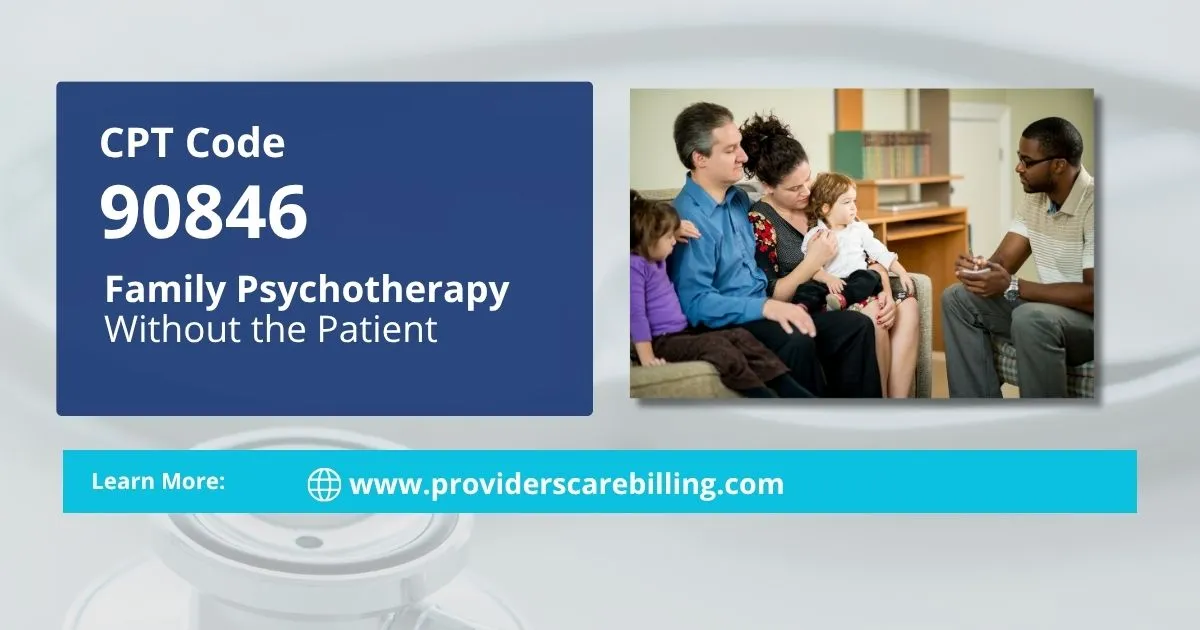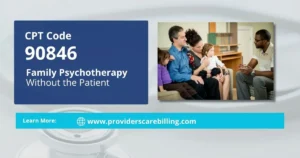In mental health, CPT codes for therapy assist providers in receiving payment for the services they deliver to patients. The accurate and clear application of CPT codes confirms the precise services delivered by providers. Proper coding is crucial to ensure that providers are compensated accurately and without facing any legal, insurance, or compliance issues.
One essential code is the CPT code 90846. This is applicable when a therapist counsels a client’s relative or guardian without the client being present. Therapists who work with families and caregivers need to know how to use 90846 appropriately.
This article will explain how to use this code for billing and what the scenarios of using it and other documentation tips and errors to avoid claim denials.
What Is CPT 90846?
90846 CPT code is used to document therapy sessions conducted between the therapist and a family member or caregiver of the patient. The primary focus of the therapist during these sessions is on strategies that may enhance treatment and assist family members in creating a more supportive environment for quicker recovery. In this type of therapy, the patient is not permitted to attend.
Time range of 90846
The time range for this service is generally set at 50 minutes. If the session is shorter than this period, it cannot be billed with this code. It is also an independent code and does not require the patient to be present. There is likewise no evaluation and management services involved.
Who can bill it?
Mental health practitioners, such as a psychologist, LCSW (licensed clinical social worker), licensed professional counselor, or marriage and family therapist, can bill with CPT code 90846.
Clinical Examples of 90846 Usage
A therapist may have several reasons for meeting family members without the client. For example,
· A parent participates in a session focused on managing a child’s behavior at home.
· A partner interested in learning how to assist their spouse living with depression.
· A caregiver/nurse who takes care of an elderly patient with dementia requires some coping skills.
· A son who has to deal with the emotional crisis of his father
Some of these therapies may focus on education, emotional support, and practical assistance. The aim is to assist the family to know the client’s condition and make sure that the family is able to provide a safe environment.
It is possible that the client is not attending because they are not emotionally stable. Or the therapist might want to discuss some critical issues that do not include the client.
Using family therapy without the patient present CPT code also aligns with HIPAA regulations. Therapists essentially document the reason for the session. Primarily, these sessions still have to be part of the treatment plan for the client.
Procedures for billing and documenting
Here are some necessary requirements that a session should meet to fall in the category of the 90846 CPT code.
· Last for 50 minutes or more
· Have at least one family member or caregiver present
· It is directly related to the client’s therapeutic objectives
Documentation should include the details
· The length of each session
· Who attended it
· Why the session was conducted (e.g., behavior support or education management)
· The results or progress made in the session
Avoid including:
· Wrong information about the patient or information about another patient
· General discussion with family which not focus on the client’s treatment strategies
· Notes that show the session was general and not purely therapeutic
CPT 90846 vs 90847
The 90847 is a twin code of 90846. These two CPT codes for couples therapy can easily be mixed, but their exact use is very important both for patients’ treatment and for reimbursement.
Here is a quick comparison table:
| Code | Patient Present? | Session Type | Typical Use |
| 90846 | No | Family Therapy | Parent guidance |
| 90847 | Yes | Family Therapy | Joint therapy |
When both the patient and the family or caregiver are present in the session, the provider uses the code 90847. Both codes cannot be billed for the same session.
Insurance and Reimbursement Tips
Each insurance provider has its own rules and regulations for CPT 90846. To prevent denial of service:
· Review the Member’s plan prior to booking sessions
· Obtain authorization, if applicable
· Ensure cases of medical necessity are logged appropriately
In order to prove necessity, detail how the session aligns with the client’s diagnosis and treatment objectives. In general, payers will approve the request as long as there is an active treatment plan outlined in it.
Each payer and location may have differing reimbursement values against the family therapy CPT code. In most cases, it will fall in line with other 50-minute therapy codes, but always check the insurance company’s reimbursement rates and payer policy.
Telehealth Services and 90846
Therapists nowadays conduct sessions on highly secure video conferencing platforms. Some states and insurers permit 90846 billing to be claimed through telehealth.
To use it:
· Confirm that the relative is situated in the region where the therapist holds a license
· Use a secure platform
· Show on the notes that the session was held remotely and by whom, as well as who attended
· Always verify with state-level policies on telehealth services and third-party payer policies in order to remain compliant.
Avoiding Billing Errors
Here are some of the noted errors directly relating to CPT code 90846 billing discrepancies:
· Don’t apply this code if patient is present in the session, for this code 90847 instead
· Failure or lack of clinical justification for documenting time, or a clinical reason
· Integrating therapy into social or educational events
The clinicians who follow these guidelines are less likely to experience billing issues or audits. Supervisors and billers do not have to be micromanaged to ensure quality work is done.
💡 Related: Want to learn about billing for crisis psychotherapy sessions?
Understanding how CPT codes are used in different therapeutic scenarios is key. For instance, when it comes to urgent mental health interventions, CPT 90839 and 90840 come into play. These codes are used for crisis psychotherapy and have specific billing guidelines that differ from standard family or individual sessions.
Read: CPT 90839 vs 90840 – Billing for Crisis Psychotherapy Sessions.
Closure
The mental health industry in general relies on the 90846 CPT code. It facilitates the therapy of families and caregivers, which benefits the treatment plan overall. Proper billing can and should be defended by claims like these, leading to better results for the clients.
Clarifying guidelines for the payers is important, along with documenting strategically and not in the presence of the patient.
Pro Tip
Enlist the services of a certified biller and lessen the hassle of billing mistakes, delayed payments, and increase the time devoted to the patients.





